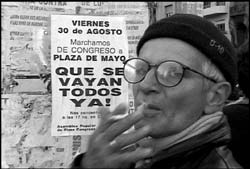

No. 2
March 2005
Firefly Journal
Because the End Times Never End and Everything is Still Possible
Contents |
About Firefly |
Archives |
Search

Our first night in Argentina, in early 2002, we followed thousands of Argentines to the Plaza de Mayo. Chants echoed off the canyon walls of Buenos Aires skyscrapers, "Que se vayan todos, que no quede ni uno solo!" – "Throw them [the politicians] all out, not even one left!" along with the banging of thousands of pots and pans. They were reacting to the economic collapse less than two months before with an inspiring resurgence of grassroots democracy and citizen involvement.
Bank accounts were frozen in the collapse and people still didn't have full access to their savings. On another evening we watched people rope off a street corner in an upper-middle-class barrio of Buenos Aires, and discuss what to do. By the light of a nearby MacDonald's golden arches, two hundred people took turns offering ideas and listening to their neighbors.
"This government is really screwed up," said one woman, "Old folks are dying, kids are starving! This is the first time I have spoken out." Followed by a gray-haired man, "I think we should form a club to buy our fruits and vegetables together at the central market." Then a guy in his twenties, "We should set things up to pay our taxes directly to the local assembly, instead of the government of traitors and crooks." Proposals were voted up or down, and some were carried forward to a city-wide assembly. There was particular enthusiasm for one man's proposal: "We've been dealing with the International Monetary Fund for years. I say their money is filthy, it represents old people dying and children starving. It's very simple, let's not take one more penny from the IMF, not one!"
From 1976-83, Argentina went through a brutal military dictatorship, where over 30,000 people were killed or disappeared. During that period Argentina began to embrace neo-liberal globalization, which continued long after democracy returned. They welcomed foreign corporations, removed protection for local industry, cut and privatized government services, reduced government regulation of the economy, and borrowed billions from foreign banks. But the promised economic boom was short-lived, and benefited only the very small upper class. In December 2001, Argentina defaulted on its foreign debt, and the Argentine economy collapsed. To stem the flow of dollars out of the country, the government froze bank accounts. Millions were thrown out of work, and in massive protests, the same phrase was on everyone's lips, "Que se vayan todos!"
But in the months that followed, Argentines responded to the crisis with a wave of democratic renewal and civic engagement. A new, open spirit spread to all corners of Argentine life. My partner and photographer, Mark Dworkin, and I plunged into the fray, filming at demonstrations where people blocked major highways; on a commuter train platform at midnight with cartoneros waiting to go home, their carts piled high with scavenged recyclables; at community meetings; at once-bankrupt factories that had re-opened as workers' cooperatives; at land takeovers where people were building houses together and planting large community gardens.
We started in a middle-class neighborhood at a barbecue in support of a growing army of free-lance recyclers. We visited barter fairs, factories taken over by their workers, and community centers. We shot our footage close, on the move, to intensify the feeling of participating in an exciting time.
What united these stories was a common "can-do" attitude as Argentines faced difficulties with a spirit of hope while working together for the common good. "We got in this mess, because we weren't participating," said one middle-aged woman. "Now we are getting involved, figuring out what went wrong and how to make it better. Things are bound to improve."
Sometimes it meant humor, like when a saleswoman, in a bankrupt factory of men's clothing that was taken over and run by its workers, tried to entice buyers from North America by joking about Argentina's low prices. In another setting, poignancy. On a highway blocked by unemployed workers, a young man who identified himself as a Catholic let us know that on September 11 he had prayed for people in the U.S., and his church collected donations for the victims, "in spite of everything," he said. "We hope that someday you will help us too."
Sometimes, it meant a determination to remember. In front of the President's residence, the Casa Rosada, the Mothers of the Disappeared reminded onlookers of the terrible political repression under the most recent military dictatorship, which still casts a shadow.
Next page >>
Web design copyright ©2005 Fireflyjournal.com.
Authors reserve all rights to their work.